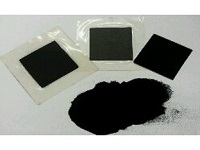High-Efficiency Hydrogen Production

Technology Description:
The team led by Pajarito Powder will develop a reversible hydrogen electrode that would enable cost-effective hydrogen production and reversible fuel cells. Both electrolyzers and fuel cells, generally operate in acidic conditions that rely on expensive precious metal catalysts to avoid corrosion. Running the electrochemical cell in alkaline conditions reduces the requirements for the oxygen electrode, but effective and inexpensive electrocatalysts for the hydrogen electrode still need to be developed. This project aims to develop a bi-functional (i.e. two way) low-cost catalyst that runs in alkaline conditions capable of oxidizing or reducing hydrogen depending on whether power is needed immediately, or needs to be stored. By integrating the electrolyzer and fuel cell into one system, the overall cost could be drastically reduced, which would open an entire suite of new applications including grid load-leveling and long-term energy storage applications. The system will be compatible with intermittent energy sources because it can operate at lower temperatures than competiting technologies, thus allowing startup times on the order of seconds.
Potential Impact:
If successful, this technology could yield greatly improved water electrolyzers, which could enable low-cost energy storage compatible with intermittent renewable energy sources, such as solar and wind power.
Security:
Storing energy from intermittent renewables over long durations in a cost-effective manner could reduce demand on the electric grid, while produced H2 or derived liquids could provide a low-carbon alternative to fossil fuels for transportation.
Environment:
Clean energy storage technologies could allow high penetration of emissions-free renewable power.
Economy:
The team’s innovations could reduce the cost of long-term energy storage and therefore enable renewables to be more cost competitive with conventional generation sources.
Contact
ARPA-E Program Director:
Dr. Grigorii Soloveichik
Project Contact:
Dr. Barr Zulevi
Press and General Inquiries Email:
ARPA-E-Comms@hq.doe.gov
Project Contact Email:
bzulevi@pajaritopowder.com
Partners
University of New Mexico
Northeastern University
ProtonOnSite
IRD Fuel Cells, LLC
Related Projects
Release Date:
01/07/2015
